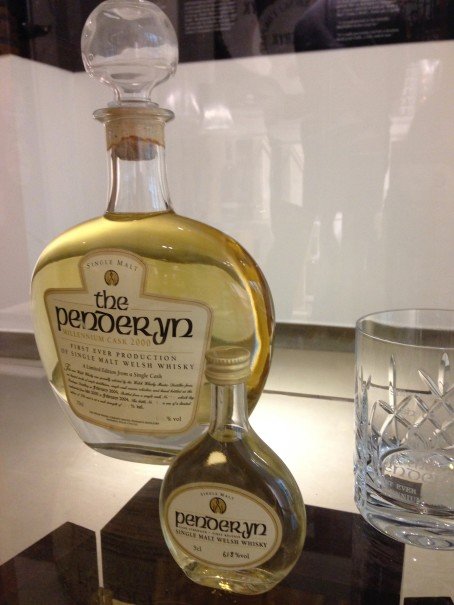
Who Knew That Wales Makes Its Own Whiskey?

Who Knew That Wales Makes Its Own Whiskey?
Wysgi in Wales
Half of the blood running through my veins is Welsh. That half comes from my father, who has been ordering drinks in Cardiff pubs since he was tall enough to see over the bar. Now a permanent U.S. resident, he jumps at any chance to relive and pass down his memories of pub crawls, rugby matches, and mountain hikes in South Wales.
During my early childhood visits to Wales, I was never allowed to join in the activities that involved knocking back pints of warm Guinness or Brains. But nearly two decades later, I returned to the land of my booze-loving people, finally of the requisite height to see over the bar and order a pint. And order I did.
In between all the beer, my family and I managed to fit in a few of the obligatory sight-seeing destinations. I played the part of tourist and stopped in a gift shop at Caerphilly Castle. Nestled among miniature replicas of castles and catapults were little bottles of Welsh wysgi. I assumed it must be a marketing gimmick. Irish and Scotch whisky, sure. But Welsh?
A quick look at a brochure revealed, much to my surprise, that Wales does produce its own whisky, but it’s only been doing so for a little over a decade. We immediately decided that it was time for a break from beer, so the next day, we drove the thirty miles out of Cardiff to the outskirts of the Brecon Beacons National Park, where Penderyn Distillery produces single malt Welsh whisky using water from an aquifer in the rolling mountain range.
The tiny, traditional village of Penderyn isn’t a place you’d expect to find a liquor production facility. In fact, we almost didn’t find it. But, thanks to directions from a heavily-accented local, we arrived at the Visitor Centre and booked ourselves a tour, to include a tasting, of course.
Our tour guide was sweet and friendly, but possessed the classic British reserve, announcing the distillery’s accolades in the form of a question so as not to come off as presumptuous. (‘We’ve won a lot of awards, haven’t we?’)
We started the tour by strolling through an exhibition outlining the history of whisky in Wales, where we learned that the Evan Williams was a whisky distiller in Pembrokeshire back in the 1700s. This was before he immigrated to the U.S. to help found the Kentucky whiskey industry.
In her thick but charming Valleys accent, our guide explained that the last genuine bottle of Welsh whisky was produced in the late 1800s at a distillery in Frongoch in North Wales. Production had ceased as a result of the temperance movement, which put an end to legal distillation in Wales. This bottle is displayed in the tasting room next to Penderyn’s first bottle: the first whisky produced in Wales in over a century.
Penderyn uses a one-of-a-kind single copper pot still that is completely different from conventional two or three pot stills used in Scottish and Irish distilleries. The unique technology in the single pot still removes undesirable chemical compounds while producing a complex mix of flavors. Before blending, the spirit is 92% ABV. Each tour participant was given a chance to taste a drop of the fiercely strong, yet remarkably smooth liquid. A drop was all we needed.
The best part was yet to come: after our production lesson, we enjoyed abundant samples of the unique and flavorful finished whiskies, a result of meticulously monitored maturation in various casks, ranging from Buffalo Trace bourbon and old Islay whisky barrels to Madeira barriques from Portugal.
We left the distillery with armfuls of whisky bottles to enjoy later, very pleased with our decision to explore the world of Welsh distilling. It wasn’t until an hour afterwards, when we began our ascent of Pen-y-Fan (the highest mountain in South Wales) that we began to regret drinking whisky at 11 o’clock in the morning.